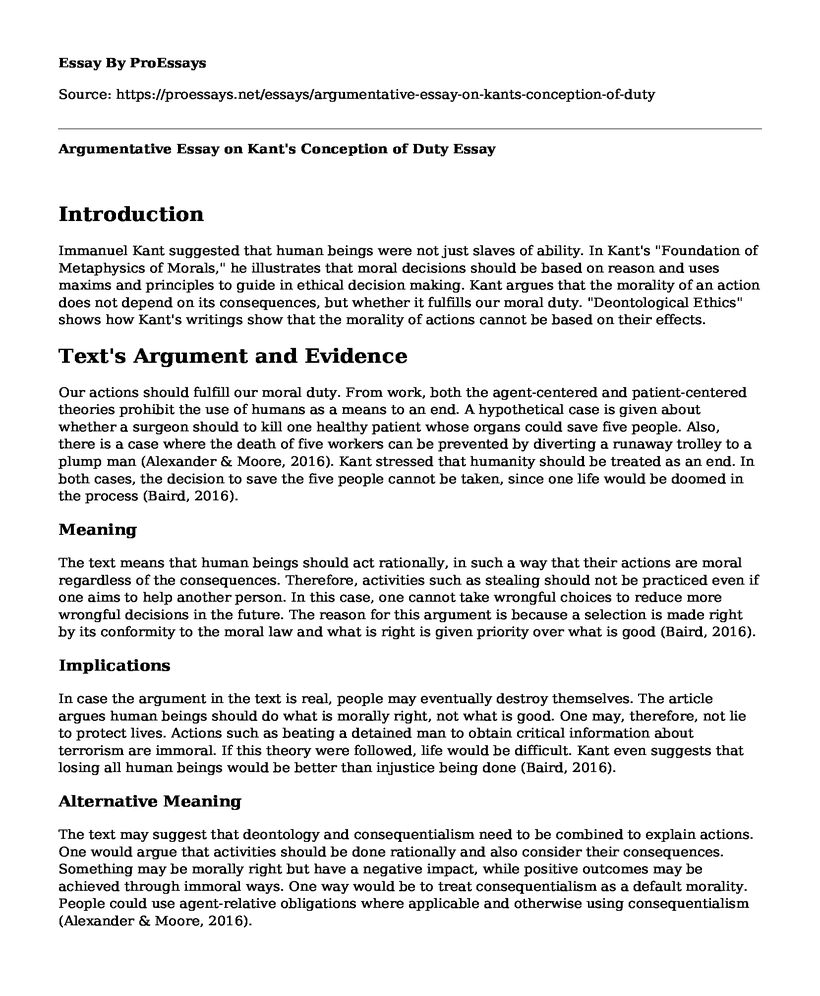Introduction
Immanuel Kant suggested that human beings were not just slaves of ability. In Kant's "Foundation of Metaphysics of Morals," he illustrates that moral decisions should be based on reason and uses maxims and principles to guide in ethical decision making. Kant argues that the morality of an action does not depend on its consequences, but whether it fulfills our moral duty. "Deontological Ethics" shows how Kant's writings show that the morality of actions cannot be based on their effects.
Text's Argument and Evidence
Our actions should fulfill our moral duty. From work, both the agent-centered and patient-centered theories prohibit the use of humans as a means to an end. A hypothetical case is given about whether a surgeon should to kill one healthy patient whose organs could save five people. Also, there is a case where the death of five workers can be prevented by diverting a runaway trolley to a plump man (Alexander & Moore, 2016). Kant stressed that humanity should be treated as an end. In both cases, the decision to save the five people cannot be taken, since one life would be doomed in the process (Baird, 2016).
Meaning
The text means that human beings should act rationally, in such a way that their actions are moral regardless of the consequences. Therefore, activities such as stealing should not be practiced even if one aims to help another person. In this case, one cannot take wrongful choices to reduce more wrongful decisions in the future. The reason for this argument is because a selection is made right by its conformity to the moral law and what is right is given priority over what is good (Baird, 2016).
Implications
In case the argument in the text is real, people may eventually destroy themselves. The article argues human beings should do what is morally right, not what is good. One may, therefore, not lie to protect lives. Actions such as beating a detained man to obtain critical information about terrorism are immoral. If this theory were followed, life would be difficult. Kant even suggests that losing all human beings would be better than injustice being done (Baird, 2016).
Alternative Meaning
The text may suggest that deontology and consequentialism need to be combined to explain actions. One would argue that activities should be done rationally and also consider their consequences. Something may be morally right but have a negative impact, while positive outcomes may be achieved through immoral ways. One way would be to treat consequentialism as a default morality. People could use agent-relative obligations where applicable and otherwise using consequentialism (Alexander & Moore, 2016).
The original account is more persuasive because it shows different types of deontological theories. It also shows how deontologists have worked to eliminate the weaknesses of the argument while maintaining its purity. Also, it would be challenging to combine the two different theories (Alexander & Moore, 2016).
Personal View
I believe that the morality of an action is determined by society's norms and culture passed on from parents to their children. The culture and standards dictate what action is morally right or wrong. One should, therefore, keep these norms in mind while making a decision. One does not need to consider the decision itself as deontologists argue. Also, unlike consequentialism, the consequences of the action are not considered as long as it conforms to the norms (Alexander & Moore, 2016). All members of society should also follow the rules. Societal norms dictate that stealing is wrong; hence, any act of theft is immoral.
Someone may argue that societal norms and culture cannot be used to determine the morality of actions. An example would be a case of a parent stealing food to feed his hunger-stricken family in a society whose norms prohibit theft. The move would be viewed as immoral. Another example would be doing something right according to the community, only to lead to dire consequences later. However, I believe the societal norms and culture to be better suited to explain behavior since they govern every possible occurrence. For instance, someone may know a person's intention of killing his family to choose to report to the relevant authority, instead of killing the person intending to murder
Conclusion
Kant showed the morality of an action does not depend on consequences, but on whether the activity conforms with our moral duty. "Deontological Ethics" furthered the claim. However, the text could indicate a possible combination of consequentialism and deontology. I believe the societal norms affect the morality of an action.
References
Alexander, L., & Moore, M. (2016.) Deontological Ethics, The Stanford Encyclopedia of Philosophy <https://plato.stanford.edu/archives/win2016/entries/ethics-deontological/>.
Baird, F. (2016). Philosophic Classics: From Plato to Derrida. Routledge.
Cite this page
Argumentative Essay on Kant's Conception of Duty. (2022, Feb 12). Retrieved from https://proessays.net/essays/argumentative-essay-on-kants-conception-of-duty
If you are the original author of this essay and no longer wish to have it published on the ProEssays website, please click below to request its removal:
- Hobbes's Premises About Human Nature Essay
- Being Moral in Philosophy - Essay Sample
- Reaction to the American Dystopian Dream - Essay Sample
- Living an Ethical Life: Achieving Goals of Poverty, Environment & Animal Welfare - Essay Sample
- Essay Example on Morality and Consequences: A Consequentialist Debate
- Essay on Fate & Free Will: Philosophers & Theologians Debate on Coexistence
- Paper Example on Media Consolidation: A Threat to American Democracy?







